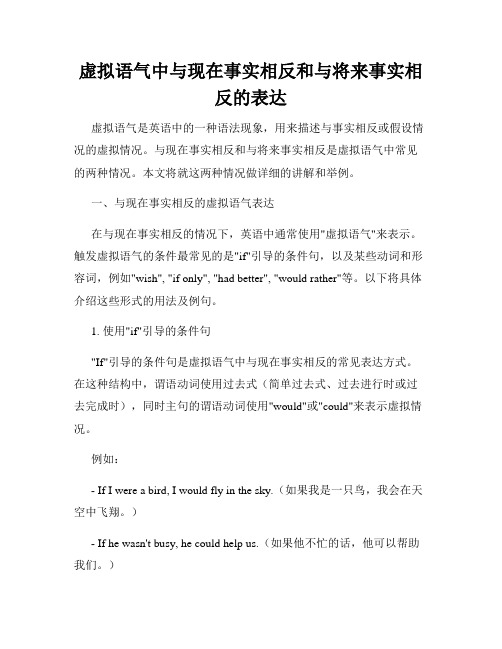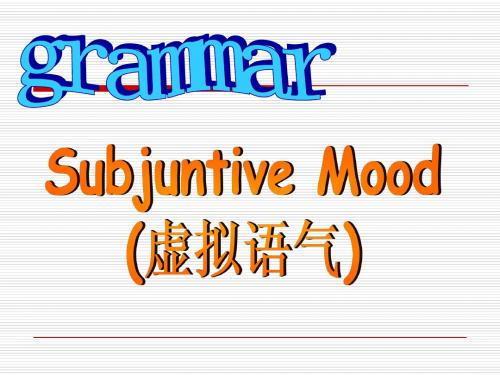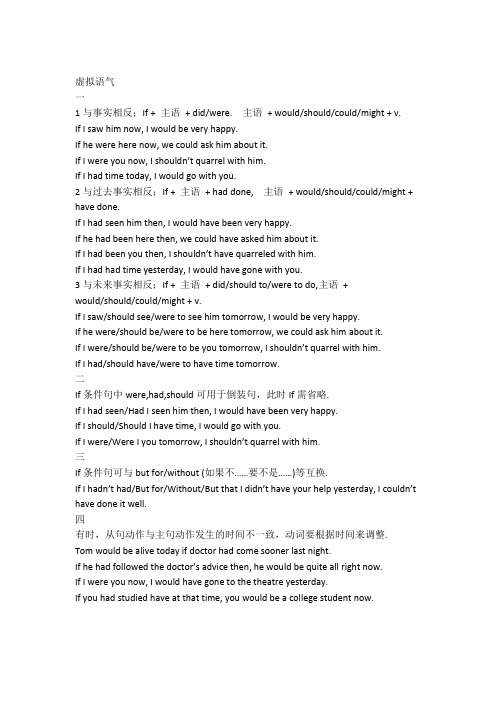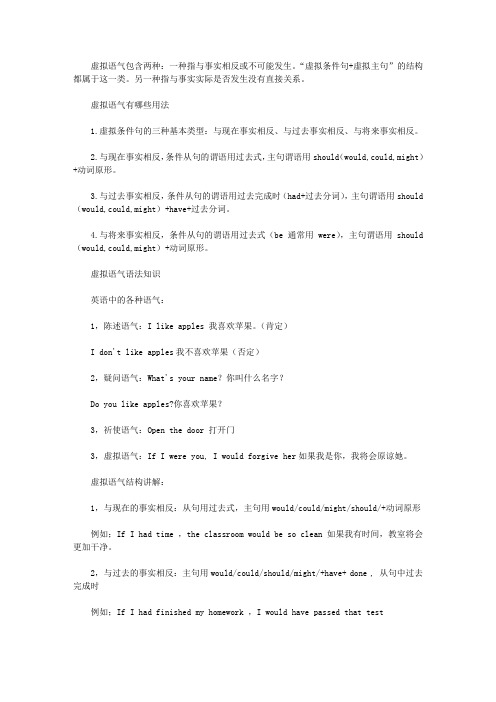虚拟语气 与事实相反,要用虚拟语气
虚拟语气

If it snowed/were to snow/should snow tomorrow,we could change our plan.
如果明天下雪,我们会改变计划。
将来
二、虚拟语气的倒装形式
1)If it had not been for your help,we would never have been able to get out of trouble. → Had it not been for your help,we would never have been able to get out of trouble. 2)If it should snow tomorrow,we would put off our trip. → Should it snow tomorrow,we would put off our trip. 3)If I were you,I would buy that car. → Were I you,I would buy that car.
他立刻去老师的办公室很有必要。
增:
现在的事实 If it were not for the fact that you are ill,I would ask you to do this right now.
如果不是你病了,我会让你立刻做这件事。
If he had followed my advice,he wouldn’t 过去 have lost his job.
如果他听了我建议,他不会失去他的 工作。
情况3:与将来事实相反
If sb. did/were to do/should do …,sb. would/could/might do.
虚拟语气中与现在事实相反和与将来事实相反的表达

虚拟语气中与现在事实相反和与将来事实相反的表达虚拟语气是英语中的一种语法现象,用来描述与事实相反或假设情况的虚拟情况。
与现在事实相反和与将来事实相反是虚拟语气中常见的两种情况。
本文将就这两种情况做详细的讲解和举例。
一、与现在事实相反的虚拟语气表达在与现在事实相反的情况下,英语中通常使用"虚拟语气"来表示。
触发虚拟语气的条件最常见的是"if"引导的条件句,以及某些动词和形容词,例如"wish", "if only", "had better", "would rather"等。
以下将具体介绍这些形式的用法及例句。
1. 使用"if"引导的条件句"If"引导的条件句是虚拟语气中与现在事实相反的常见表达方式。
在这种结构中,谓语动词使用过去式(简单过去式、过去进行时或过去完成时),同时主句的谓语动词使用"would"或"could"来表示虚拟情况。
例如:- If I were a bird, I would fly in the sky.(如果我是一只鸟,我会在天空中飞翔。
)- If he wasn't busy, he could help us.(如果他不忙的话,他可以帮助我们。
)2. 使用"wish"和"if only""Wish"和"if only"被用来表达对现在事实的虚拟希望或遗憾。
在这种情况下,谓语动词要使用过去式,并且要注意动词的时态和人称的一致性。
例如:- I wish I had more money.(我希望我有更多的钱。
)- If only I could speak French.(要是我会说法语就好了。
高三英语虚拟语气

5. It’s (high) time句型:当It’s time后用 that从句时应该为: 主语+should+原形 主语+过去时 eg: 1) It’s time that you went to school. 2) It’s time that you should go to school.
色。
3) But that she was afraid, she would have said no.
7) If I ____ more time, I would have gone with him.
A. had B. had had C. have had D. would have
8) If he ___ to the teacher attentively, he ___ the answer to the problem now.
一、虚拟条件句: 条件状语从句是非真实情况时,要用虚拟语气。
If条件句 主句
与现在事实相反 与过去事实相反
did(be动词 would(或could, should, might) do 用were)
had done
would(或could, should, might) have done
did(were) 与将来事实相反或 should do would(或could, should, might) do 可能相反 were to do
Suggest 表示暗示,说明的意思时用真实语气
eg: Her expression suggested that she was angry.
He suggested that we (should) go to school at once.
与现在事实相反的虚拟语气例句

与现在事实相反的虚拟语气例句
哎呀呀,我今天可真是倒霉透顶了!“要是我今天能变成一只小鸟该多好呀,就不用上学,不用写作业啦!”我一边嘟囔着一边收拾书包准备去上学。
走在路上,阳光晒得我睁不开眼,我心里那个懊恼啊。
到了学校,同学们都在嘻嘻哈哈地打闹着。
同桌小明看到我,笑嘻嘻地说:“嘿,你今天怎么一脸不高兴呀?”我没好气地说:“哼,我要是能像你这么开心就好了。
”小明耸耸肩说:“哎呀,这有啥难的。
”
上课铃响了,老师走进教室,开始讲课。
我却怎么也集中不了精神,心里一直在想:要是我现在在外面玩耍该多好呀。
想着想着,我就开始走神了。
突然,老师叫我回答问题,我一下子懵了,结结巴巴地说不出话来。
老师瞪了我一眼,说:“上课要认真听讲!”我低下头,心里别提多难受了。
好不容易熬到了放学,我走在回家的路上,心情依然很糟糕。
看到路边的小狗在欢快地跑着,我就想:我为啥不能像小狗一样自由自在呢?回到家,妈妈已经做好了饭,看到我不高兴的样子,问我怎么了。
我嘟囔着说:“要是没有那么多作业就好了。
”妈妈笑着说:“傻孩子,没有作业怎么能学到知识呢?”
晚上,我躺在床上,想着这一天的经历,心里暗暗想:如果这一切都不是这样该多好呀。
如果我能更努力一点,上课认真听讲,也许就不会被老师批评了;如果我能更乐观一点,也许就不会觉得这么倒霉了。
可是,没有如果呀,我只能从现在开始,努力改变自己。
我知道,生活中没有那么多的虚拟语气,我们不能总是幻想如果怎样怎样。
我们要面对现实,努力让自己变得更好。
虽然有时候会觉得不如意,但只要我们坚持不懈,总会有收获的一天。
虚拟语气

虚拟语气一1与事实相反;If + 主语+ did/were. 主语+ would/should/could/might + v.If I saw him now, I would be very happy.If he were here now, we could ask him about it.If I were you now, I shouldn’t quarrel with him.If I had time today, I would go with you.2与过去事实相反;If + 主语+ had done, 主语+ would/should/could/might + have done.If I had seen him then, I would have been very happy.If he had been here then, we could have asked him about it.If I had been you then, I shouldn’t have quarreled with him.If I had had time yesterday, I would have gone with you.3与未来事实相反;If + 主语+ did/should to/were to do,主语+would/should/could/might + v.If I saw/should see/were to see him tomorrow, I would be very happy.If he were/should be/were to be here tomorrow, we could ask him about it.If I were/should be/were to be you tomorrow, I shouldn’t quarrel with him.If I had/should have/were to have time tomorrow.二If条件句中were,had,should可用于倒装句,此时If需省略.If I had seen/Had I seen him then, I would have been very happy.If I should/Should I have time, I would go with you.If I were/Were I you tomorrow, I shouldn’t quarrel with him.三If条件句可与but for/without (如果不……要不是……)等互换.If I hadn’t had/But for/Without/But that I didn’t have your help yesterday, I couldn’t have done it well.四有时,从句动作与主句动作发生的时间不一致,动词要根据时间来调整.Tom would be alive today if doctor had come sooner last night.If he had followed the doctor’s advice then, he would be quite all right now.If I were you now, I would have gone to the theatre yesterday.If you had studied have at that time, you would be a college student now.(五)wish +从句从句中用虚拟语气If onlywould / could / might + v. (与将来事实相反)did (与现在事实相反)had donecould have done (与过去事实相反)He could / would / might visit us tomorrow.I wished He visited us today.If only He had visitedus yesterday..could have visited(六)would rather do sth than do sthsb did (与现在、将来事实相反) would rather + 从句had done(与过去事实相反)He would rather visit us than stay at home.he visited us today.I would rather he visited us tomorrow.he had visited us yesterday.二、be型虚拟1.advise/suggest/order/command/demand/insist(建议应)/require/request/decideHe demanded that John (should) go there at once. 宾从She advised that he (should) give up smoking. 宾从I made a suggestion that he (should) go there at once. 同位语从句My suggestion was that he (should) go there at once. 表语从句This is the suggestion that/which he made at the meeting. 定从2.It is natural/important/necessary/surprising/strange/funny/suggested/requested/ordered/arranged(安排)/decided/a pity/a shame/no wonder(难怪) 从句It is necessary that we (should) keep the balance of nature.It is important that he (should) be sent there at once.It is requested that Miss Cai (should) give a performance at the party.It is strange that he (should) say so.It is a pity that he (should) miss such a golden chance.didIt is time thatShould dogot up.It is time that weshould get up .As if/as though 可虚拟可不虚拟he were 10 years younger today.It looks as if a ghost were running after him now.he hadn’t had a meal for a week.The grandma speaks as if she were a girl in one’s teens.。
英语虚拟语气的假设用法与与现实相反的情况

英语虚拟语气的假设用法与与现实相反的情况虚拟语气在英语中是一种特殊的语法形式,用于表达与现实相反或假设的情况。
虚拟语气通常在条件句或表达意愿、建议、命令等语境中使用。
本文将介绍英语虚拟语气的假设用法,并探讨与现实相反的情况。
一、虚拟语气的假设用法虚拟语气的假设用法常用于表示与现实相反的情况,包括:1. 与现在事实相反的情况要表达与现在事实相反的假设情况,我们可以使用"would/could/might + 动词原形"的结构,例如:- If I were a bird, I would fly in the sky.(如果我是一只鸟,我会在天空中飞翔。
)- If I had enough money, I could buy a new car.(如果我有足够的钱,我可以买一辆新车。
)2. 与过去事实相反的情况要表达与过去事实相反的假设情况,我们可以使用"had + 过去分词"的结构,例如:- If I had studied harder, I would have passed the exam.(如果我学习更努力,我就能通过考试了。
)- If she had known, she would have told us.(如果她知道的话,她就会告诉我们。
)3. 与将来事实相反的情况要表达与将来事实相反的假设情况,我们可以使用"were to + 动词原形"或"should + 动词原形"的结构,例如:- If it were to rain tomorrow, we would stay at home.(如果明天下雨,我们会呆在家里。
)- If she should arrive late, please let her in.(如果她迟到了,请让她进来。
)二、与现实相反的情况利用虚拟语气的假设用法,我们可以表达与现实相反的情况。
虚拟语气总结

虚拟语气总结虚拟语气是英语语法中的一种特殊语态,用来表达一种假设、愿望、建议、命令、怀疑或可能性的情态。
在句子中,虚拟语气主要通过动词的形态变化和句子结构来表示。
一、虚拟语气的形态变化:1. 过去虚拟语气:主要用于表示与事实相反的情况或不可能实现的愿望。
形式为:had + 过去分词。
例如:“If I had enough money, I would travel around the world.”2. 现在虚拟语气:主要用于表示与现在事实相反的情况或不可能实现的愿望。
形式为:动词原形+过去式。
例如:“If I were you, I would study harder.”3. 条件句中的虚拟语气:主要用于表示条件句中的假设情况。
形式为:should/would/could/might + 动词原形。
例如:“If it should rain tomorrow, we would stay at home.”二、虚拟语气的用法:1. 表达与现在事实相反的情况:使用“were”作为虚拟语气动词,无论主语是单数还是复数。
例如:“If I were you, I would apologize.”2. 表达与过去事实相反的情况:使用“had”作为虚拟语气动词。
例如:“If I had studied harder, I would have passed the exam.”3. 表达不可能实现的愿望:使用虚拟语气动词的适当形式来表示愿望、建议或命令。
例如:“I wish I were taller.” “If only I could speak French.” “She demanded that he leave immediately.”4. 表达估计、推测、怀疑或建议:使用虚拟语气动词的适当形式来表示可能性。
例如:“It is important that he arrive on time.” “She suggested that we go to the cinema.”三、虚拟语气的注意事项:1. 注意一致性:在条件从句中,主句和从句的动词形式要保持一致。
虚拟语气的用法归纳讲解

虚拟语气包含两种:一种指与事实相反或不可能发生。
“虚拟条件句+虚拟主句”的结构都属于这一类。
另一种指与事实实际是否发生没有直接关系。
虚拟语气有哪些用法1.虚拟条件句的三种基本类型:与现在事实相反、与过去事实相反、与将来事实相反。
2.与现在事实相反,条件从句的谓语用过去式,主句谓语用should(would,could,might)+动词原形。
3.与过去事实相反,条件从句的谓语用过去完成时(had+过去分词),主句谓语用should (would,could,might)+have+过去分词。
4.与将来事实相反,条件从句的谓语用过去式(be通常用were),主句谓语用should (would,could,might)+动词原形。
虚拟语气语法知识英语中的各种语气:1,陈述语气:I like apples 我喜欢苹果。
(肯定)I don't like apples我不喜欢苹果(否定)2,疑问语气:What's your name?你叫什么名字?Do you like apples?你喜欢苹果?3,祈使语气:Open the door 打开门3,虚拟语气:If I were you, I would forgive her如果我是你,我将会原谅她。
虚拟语气结构讲解:1,与现在的事实相反:从句用过去式,主句用would/could/might/should/+动词原形例如;If I had time ,the classroom would be so clean 如果我有时间,教室将会更加干净。
2,与过去的事实相反:主句用would/could/should/might/+have+ done , 从句中过去完成时例如;If I had finished my homework ,I would have passed that test如果当时我完成了我的做,我就能够通过我的考试了。
- 1、下载文档前请自行甄别文档内容的完整性,平台不提供额外的编辑、内容补充、找答案等附加服务。
- 2、"仅部分预览"的文档,不可在线预览部分如存在完整性等问题,可反馈申请退款(可完整预览的文档不适用该条件!)。
- 3、如文档侵犯您的权益,请联系客服反馈,我们会尽快为您处理(人工客服工作时间:9:00-18:30)。
虚拟语气与事实相反,要用虚拟语气虚拟语气表示说话人的愿望、假设、猜测或建议,而不表示客观存在的事实。
虚拟语气通过谓语动词的特殊形式来表示,对虚拟语气在各种句式中的用法介绍如下:A).条件从句的虚拟语气Eg. 如果我是你,我就不看电视了.If I were you, I should/would not watch TV.如果我做完家庭作业,我就去参加晚会.If I did/had done my homework, I would go/have gone to the party.如果你昨天晚上不看电视,就不会迟到了.If you hadn’t gone to the cinema, you would not have been late for class.如果你努力地学习的话,你就会考试及格了。
If you had studied harder, you would have passed the exam.The plants in our garden__________better if it had not rained so much last year.A.had grownB.would have grownC.were growingD.would growNote:a).条件从句中if 的省略,要倒装如果条件从句的谓语动词包含有were或助动词、情态动词had,should,could,有时可将连词if省去,而将条件从句的主语置于were,had,should,could之后。
这种用法主要用于书面语,如:a.与现在相反:If I were you (=Were I you) , I would go with him.b.与过去相反:If I had had time then (=Had I had time then), I would have gone with you.c.与将来相反:If I were to visit/should visit/visited the Great Wall tomorrow, (=Were I to /Should I visit the Great Wall tomorrow), I wouldtake my son with me.注意:在否定句中not不可提至主语前,如:(误)Weren’t I here now, I would be in the bus.(正)Were I not here now, I would be in the bus.b).without 可以代替条件从句Eg.没有水和空气,我们就不能生存。
We would not live without water or air.c) 混合虚拟条件句如果条件从句的动作和主句的动作不是同时发生,主句和从句的谓语动词的形式应分别根据各自所表示的时间加以调整。
这种句子叫做混合虚拟条件句。
如:If he had followed my advice,he would be quite all rightnow.(从句述说过去,主句述说现在)If China had not been liberated,the working people wouldstill be leading a miserable life.(从句表示与过去的事实相反,主句说明与现在的事实相反)d) 省略主句,只保留if(only)的条件句虚拟条件句中的表示结果的主句有时形式上可以省略,但意义仍然存在。
这种句子只保留一个if(only)条件从句,表达说话人的强烈愿望。
如:If(only)shewere my sister!她是我的妹妹就好了!e) 用but或but for引导含蓄条件句(but后跟从句,but for后跟短语: 假如没有, 要不是)But for your help,our experiment wouldn’t have been sosuccessful.假如没有你们的帮助,我们的实验是不会如此成功的。
But for the storm,we should have arrived earlier.要不是碰到暴雨我们会到得早一些。
We would have invited them to the dance,but they were too busy.要不是他们太忙,我们会邀请他们来参加舞会的。
此句可改写为:If they had not been so busy,we would haveinvited them to the dance.But that he is in hospital,He would go abroad for hissummer vacation.要不是生病住院,他就出国度暑假了。
该句可改写为:If he wereint in hospital,he would go abroadfor his summer vacatiom.f) "If o nly ..."这是一种特殊句式结构一、"If only..."用于感叹句中,是一个保留条件句,省略了主句的形式。
用来表示某人对某事的一种强烈愿望或未实现的条件,其意为"但愿……;真希望……;要是……就好了"。
常用于虚拟语气的谓语动词形式。
If o nly s he w ere m y s ister! 如果她是我姐姐该多好啊!(=How f ine i t w ould b e i f s he w ere m y s ister!)"If o nly..."引导的从句谓语动词形式分以下几种:1. If only后常接一般过去时,表示对现在的一种难以实现的愿望。
如:1)If only I had that book! 我要是有那本书就好了。
=How fine it would be if only I had the book (but I haven't the book).2)If only I were younger! 要是我年轻点儿就好了!=How fine it would be if only I were younger! (but I am not younger)3)If only my mother were here now! 要是我母亲现在在这儿就好了。
(but she isn't here now)4)How fine it would be if only they could find a way to get to the room!他们要是能够找到一条通道进入那个房间该多好啊! 2. If only后常接过去完成时,表示过去没有实现的愿望。
如:1) If only you had worked with greater care! 你当时干活时要是再认真些就好了!(but you didn't work with greater care)2) If only we had arrived in time, we would not have missed the train! 要是我们及时赶到,就不会误车了。
(but we didn't arrive in time)3. If only后常用过去将来时表示将来不大可能实现的愿望。
如:If only she would win!但愿她能赢!二、If only有时也可引导陈述语气的真实条件句,意思为"只要……"。
If o nly i t c lears u p, w e'll g o. 只要天一放晴,我们就去。
与此句型容易混淆的还有一种结构"only if...",only置于if前表示强调if条件,意为"只要……",用于引导陈述语气的真实条件句。
Only i f y ou s tudy h ard, y ou w ill p ass t he t est. 只要你努力学习,就会通过考试。
B).宾语从句的虚拟语气a).wish+宾语从句与现在/将来事实相反谓语动词--- be---were/ 动词---过去式与过去事实相反过去完成式eg. I wish I were a bird flying freely in the sky.I wish you passed the entrance exam.I wish you hadn’t been absent yesterday.b).表示请求,命令,建议的动词后(一坚持(insist),二命令(order,command),三建议(suggest,propose,advise),四要求(demand, require, request,ask)谓语动词---(should)+doeg.我们建议她去看医生。
We suggested that she (should) go to see a doctor.例外情况:suggestion,insist后从句中不用虚拟语气的问题.suggest作为“表明,暗示”时,不用虚拟语气insist作为“坚持认为”时,不用虚拟语气eg.The smile on his face suggested that he succeeded in the task.我们坚持他应该去看医生。
(坚持要sb做)We insisted that he (should) go to see a doctor.We insisted that old Li was an advanced worker in our company.Jane's pale face suggested that she ill and her parents suggested that she ______ a medical examination.A.be;should haveB.was;haveC.should be;hadD.was;hasC).主语从句的虚拟语气It is important/necessary/strange+that+主+(should) do.Eg. It is necessary that we (should) master a foreign language to find a good job.D).状语从句的虚拟语气a).方式从句与现在/将来事实相反谓语动词--- be---were/ 动词---过去式与过去事实相反谓语动词---过去完成式eg.她很悲伤仿佛整个世界都背叛了她。
